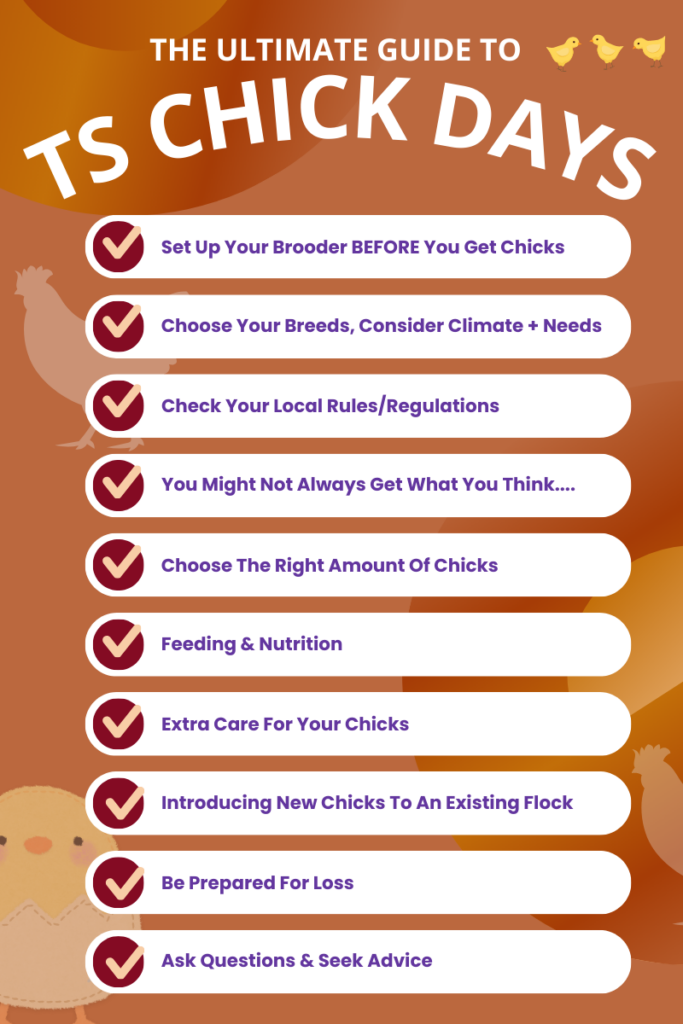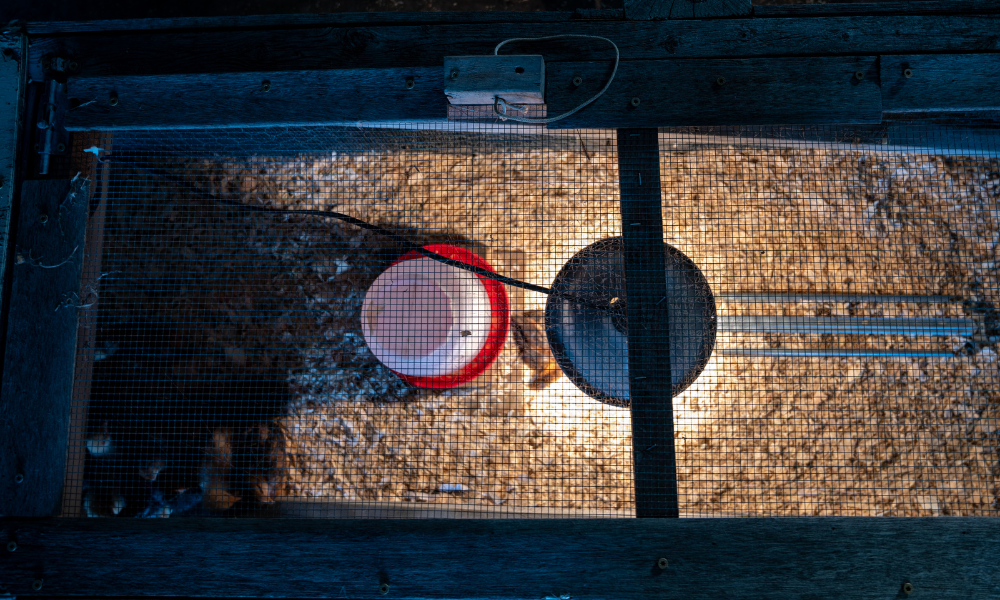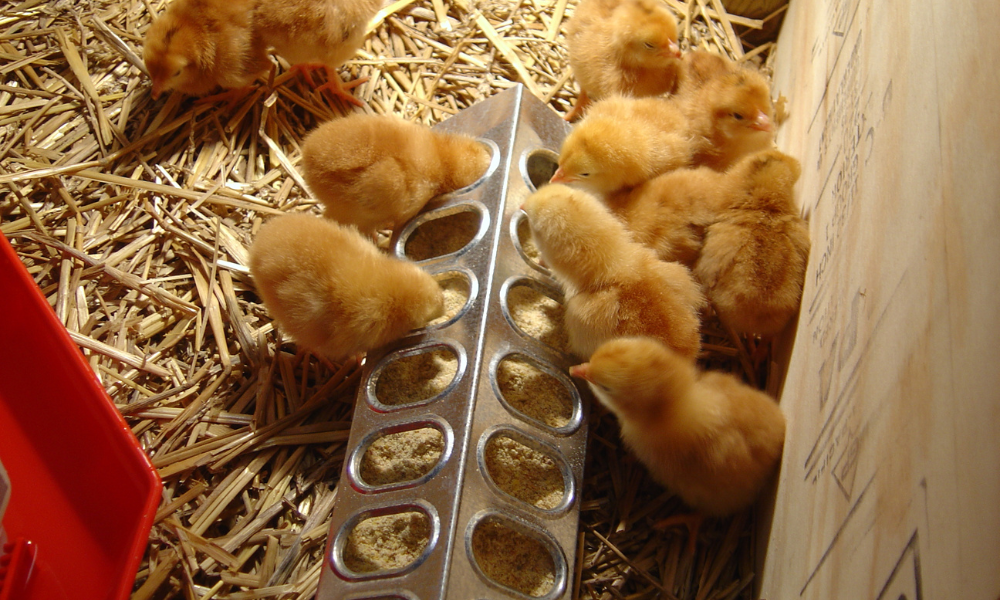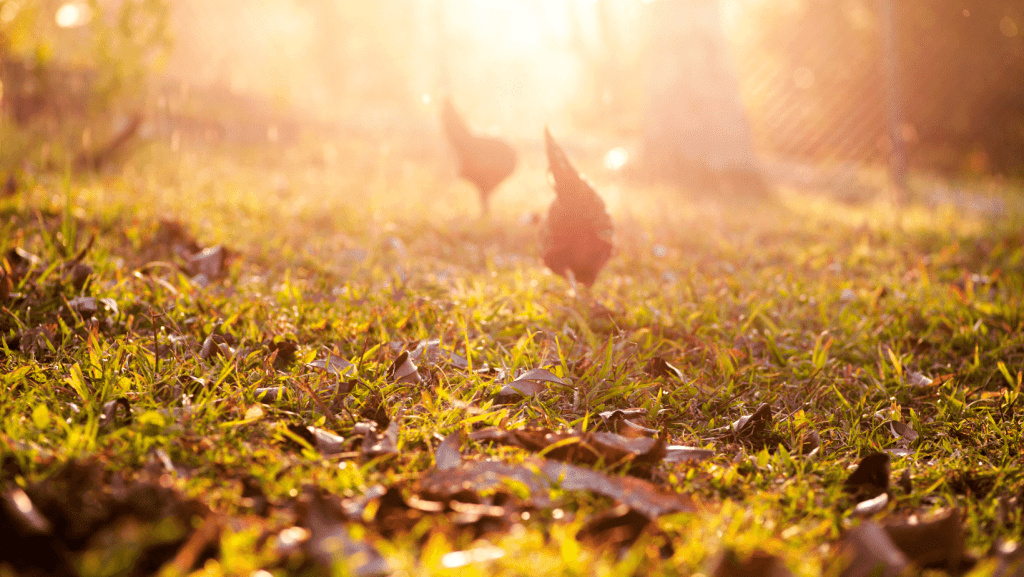*Faint Chirping In The Distance*
You know what that means…
Tractor Supply Chicks Days Are Coming!
If you’re considering starting a new flock, or simply can’t resist the urge to raise more chickens (blame chicken math) – we’ve got you covered.
Here’s the all-inclusive list of 10 things you NEED to prepare for when getting baby chicks on TSC Day.
You’ll be going from peeps to beaks in no time.
Contents
10 Essential Things To Know Before Getting Baby Chicks From Tractor Supply

1. Have Your Brooder Set Up BEFORE You Get Chicks
We all have impulses. Sometimes it seems impossible to not walk out of Tractor Supply with baby chicks on chick days.
But, it’s imperative you set up your brooder in advance of buying chicks. This way your chicks have a safe and nurturing environment as soon as you get home!
Luckily, brooders are super simple to set up, you’ll only need:
- A Suitable Enclosure:
- Galvanized Steel Tubs
- Tote Boxes
- or Even Cardboard Boxes
- Heat Source:
- Heat Lamp
- or Heat Panel
- Place your chosen heat source to one side of the brooder and your chicks will be able to regulate heat themselves.
- If your chicks are huddled together near the heat source, they’re too cold. If they’re spread out and away from the heat source, they are too hot.
- 95°F for the first week of life, decreased by 5 degrees every week until 75°F.
- Waterer:
- You can put the waterer on the ground, or suspend it just above the ground. So long as your chicks have access to fresh, clean water, either will work fine.
- Make sure it’s “chick-sized” so they can’t fall in and get wet or drown.
- Clean your waterer regularly, especially if you see any bedding/poop in there!
- Feeder & Feed:
- Chicks should always have access to food and water. Make sure you get enough chick starter feed and a good-sized feeder so they won’t run out.
- Bedding:
- Bedding helps keep the brooder clean and warm. Get the likes of pine shavings, Aspen shavings, hemp bedding, or similar. Just avoid Cedar as it’s known to be toxic to chicks.

Get Strong Animals has a great guide to setting up a brooder, here.
2. Different Breeds: Different Needs
Choosing your chicken breed has got to be one of the most exciting parts. You may even be tempted to get a few of each…
But before you do it’s important to know that different breeds are fit for different needs:
- Production Chickens: Breeds optimized for egg laying, such as Leghorns, Rhode Island Reds, and ISA browns.
- Meat Producing Chickens: Breeds that are predominately raised for their meat, or “meat birds”. These chickens lay fewer eggs but develop and grow more quickly. Because of this they often have a shorter life span, such as the Cornish Cross.
- Dual-Purpose Chickens: Breeds that are still able to lay a good amount of eggs, CAN be raised for meat, but are often simply raised as backyard chickens. Including Plymouth Rock, Orptingons, and Wyandottes.
- Ornamental Chickens: These chickens still lay eggs, but are predominantly raised in backyards for their beauty or other striking features, such as the Polish, Ayam Cemani, and Brahma.
- Bantam Chickens: Bantam chickens are much smaller breeds and lay smaller and often fewer eggs. They are often thought of as easier to take care of and require less space as they are about half the size of normal chickens. These include Silkies, Seremas, and Cochins.
Note: You should also try to match your chicken breed with your climate and environment, as some chickens are more accustomed to dealing with colder weather and warmer weather:
- Long-combed chickens do better in warmer environments as their combs and wattles help to dissipate body heat. They can more easily get frostbite in colder weather.
- Short-combed/Pea-combed chickens do better in colder environments, as they can retain their heat and don’t get frostbite on their combs/wattles as frequently!

3. Check If You’re Allowed Chickens/Roosters in Your Area
Of course, as part of your preparations, you should be checking that you’re allowed to raise backyard chickens in your area.
While most areas allow the raising of chickens there is often a limit to how many you can raise. Not to mention many suburban and urban areas do not allow the raising of roosters.
This guide can help you determine if you’re allowed chickens/roosters in your area.
4. You Might Not Always Get What You Think
When preparing, you’ll want to determine whether you’ll want any roosters in your flock (for protection, fertilization, or just as flock leaders), or if you’ll just want hens (for egg-laying, companionship, etc.).
Luckily, Tractor Supply does offer you a choice in the matter, as you’ll find two ranges of chicks available:
- Pullets: Chicks that have been sexed at birth and are “guaranteed” to be hens.
- Straight Run: Straight run chicks have not been sexed, so you have a 50-50 chance of receiving males and females.
Although Tractor Supply does a good job at sexing their chicks for the most part, some males still slip through the sexing stage and can end up with the pullets!

Source: This Reddit Post
5. Choose The Right Amount Of Chicks
While most of the time TS does have a minimum purchase rule (usually 4 for baby chicks), it’s important you only choose the right amount of chicks to suit your backyard.
To allow your chooks a healthy and happy life you should aim for roughly 4 sq ft of space per chicken INSIDE your coop, and 10-15 sq ft of space outside (in the run and/or free-ranging).
You should also be factoring in:
- How many nesting boxes you’ll need: the rule of thumb is to have at least one nesting box per 5 chickens you own, plus an extra for good measure.
- Space for roosts.
- Are they sharing the backyard with other animals/pet.
6. Feeding & Nutrition

Surprisingly, feeding your chicks is one of the easier things to do in the whole process!
That’s because you can’t go wrong if you don’t overcomplicate things.
All baby chicks need for the first 8-12 weeks is a good quality chick starter – perfectly catering to their protein and micro nutritional needs for strong and healthy development.
As your chicks start to mature you can gradually transition to a grower feed, but it’s not necessary for at least 12+ weeks.
7. Care For Your Chicks
Everybody needs a little bit of tender love and care.
While you’re at Tractor Supply, here are a few other things you should pick up to help take further care of your chicks:
- Small Thermometer
- Electrolytes: for the first few days to mix in their water (and if they get sick).
- Apple Cider Vinegar: Diluted in their waterer, amazing for almost everything.
- Probiotics: to aid in the digestion system.
Aside from the basic attention, food, heat, and water, here are a few other tips to help care for your chicks:
- Monitoring: Regularly inspect and check each of your chicks for signs of illness, dehydration, over-exercise, etc. This is especially important over the first few weeks when you want to check on them every few hours, or as frequently as you’re able.
- Cleanliness: Cleanliness of the brooder, bedding, feeder, waterer, and your chicks should be your top priority when taking care of chicks. Keep it front of mind.
- Treats: For all the info, check out this entire guide about giving treats to baby chicks.
Lise Steele has a remarkably detailed article over on Fresh Eggs Daily about caring for your chicks.
8. Introducing New Chicks To Existing Flock
If you do have an existing flock, you’ll need to take extra precautions when introducing your new baby chicks to them when they’ve reached the age they can venture outside.
This is especially true if you’ve got any existing roosters, as some roosters can get overly protective/territorial, and there are even cases of roosters attacking baby chicks.
It’s therefore best practice to take it slow and steady when introducing your existing flock to their new flock-mates:
- Start by taking your baby chicks out for “field trips” to the backyard from as young as 4-6 weeks old, keeping your existing flock in their run so there’s a barrier between the new chicks and the existing flock.
- Repeat this process as your chicks continue aging.
- After your chicks are old enough to be integrated with their future
- Don’t integrate your new chicks into your existing flock until they are fully grown.
You may optionally want to set up a separate coop in the backyard to keep your new chicks once they’ve reached between 10-14 weeks of age and if weather permits them to live outside.
9. Be Prepared For Loss

Unfortunately, baby chicks are notoriously fragile, in almost every way possible.
Meaning they are highly susceptible to sickness, disease, and physical injury.
Even chicks that are very well-taken care of and are on optimal diets can, unfortunately, get sick or pass – sometimes even without notice!
For this reason, you need to mentally prepare for the loss of your chicks or chickens, as it DOES happen.
10. Ask Questions & Seek Advice
While you’re there, don’t feel afraid to bombard the staff with questions or concerns. Every state, climate, and environment is different – so the seasoned chicken raisers in your area often have some of the best advice.
Outside of this, we recommend never stopping learning about chickens (even though it’s basically impossible to do so once you get your obsession started).
Join Facebook groups, forums, and newsletters (like ours) – and stay in touch with other chicken owners to pick up some sweet tips and build a supportive community.
When Does Tractor Supply Sell Chicks?
Tractor Supply Chick Days start between mid-February and run every day till the End Of March (subject to availability).
But, if you feel the urge to buy chickens outside this time, Tractor Supply does sell baby chicks online all year round from Hoover’s Hatchery (again, subject to availability).
How Old Are Baby Chicks From Tractor Supply?
Baby chicks from TS can be as young as one day old, but it’s normal to find them from one to three days old.
Although baby chicks tend to sell out relatively quickly, TS usually gets more every 3-7 days over mid-February and March.
Are Chicks From Tractor Supply Vacinated?
On Chick Days at Tractor Supply, baby chicks are typically NOT vaccinated.
Don’t let this stress you out though, this is completely optional. Many backyard chicken owners take the organic approach and do not vaccinate their chicks, nor give them medicated feed.
However, if you do wish to have vaccinated chicks, you can take them to a trained professional or you can order chicks online and request they be vaccinated too.
The Key Takeaways
Prepare your brooder and get all your supplies BEFORE getting chickens. This makes their transition to their new home that much safer and more stress-free for them.
Choose your chicken breed according to your climate (especially if you get extremely hot or extremely cold weather), and your needs (egg producing vs. dual purpose, etc.).
Be prepared for loss, but also be prepared to take extra care of your young chicks, as they can be quite fragile.
Otherwise do the basics of feeding, watering, and taking care of your chicks and they’ll be rewarding you later on through their eggs!
Happy farming everyone!
